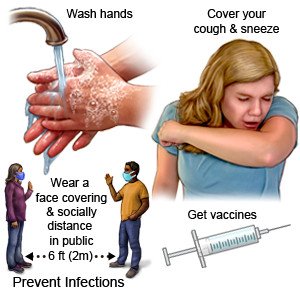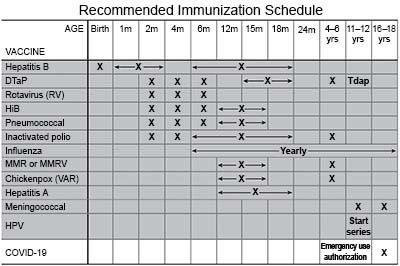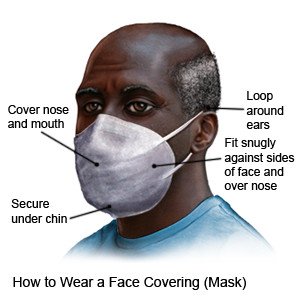Covid-19: Slow the Coronavirus Spread
Medically reviewed by Drugs.com. Last updated on Aug 4, 2025.
The virus has changed into new forms, called variants. Some variants are spreading even more quickly and easily than the original virus. COVID-19 can cause severe or life-threatening health problems in some people. Health problems can continue for weeks, months, or possibly years. Signs and symptoms of infection from any form of the virus can take up to 14 days to begin, or may not develop at all. This means you or someone around you may have the virus and pass it to others without knowing it.
 |
DISCHARGE INSTRUCTIONS:
Call your doctor if:
- You have questions about social distancing or ways to keep your home and family safe.
- You have questions or concerns about the new coronavirus or COVID-19.
How the virus spreads:
The virus can be spread starting 2 to 3 days before symptoms begin. Close personal contact with an infected person increases your risk for infection. This means being within 6 feet (2 meters) of the person for at least 15 minutes over 24 hours.
- The virus travels in droplets that form when a person talks, sings, coughs, or sneezes. The droplets can also float in the air for minutes or hours. Infection happens when you breathe in the droplets or get them in your eyes or nose.
- Person-to-person contact can spread the virus. For example, a person with the virus on his or her hands can spread it by shaking hands with someone.
- The virus can stay on objects and surfaces. You may become infected by touching the object or surface and then touching your eyes or mouth.
What you need to know about COVID-19 vaccines:
Healthcare providers recommend vaccination, even if you already had COVID-19.
- Get a COVID-19 vaccine as directed. At least 1 dose of an updated vaccine is recommended for everyone 6 months or older. COVID-19 vaccines are given as a shot in 1 to 3 doses, depending on the age of the person who receives it. COVID-19 vaccines are updated throughout the year. Your healthcare provider can help you schedule all needed doses as updated vaccines become available.

- Continue to protect yourself and others. You can become infected even after you get the vaccine. You may also be able to pass the virus to others without knowing you are infected.
- After you get the vaccine, check local, national, and international travel rules. You may need to be tested before you travel. Some countries require proof of a negative test before you travel. You may also need to quarantine after you return.
- Medicine may be given to prevent infection. The medicine can be given if you are at high risk for infection and cannot get the vaccine. It can also be given if your immune system does not respond well to the vaccine.
Help prevent the virus from spreading:
- Wash your hands often throughout the day. Use soap and water. Rub your soapy hands together, lacing your fingers, for at least 20 seconds. Rinse with warm, running water. Dry your hands with a clean towel or paper towel. Use hand sanitizer that contains alcohol if soap and water are not available. Teach children how to wash their hands and use hand sanitizer.

- Cover sneezes and coughs. Turn your face away and cover your mouth and nose with a tissue. Throw the tissue away. Use the bend of your arm if a tissue is not available. Then wash your hands well with soap and water or use hand sanitizer. Teach children how to cover a cough or sneeze.
- Stay home if you are sick or think you may have COVID-19. It is important to stay home if you are waiting for a testing appointment or for test results.
- Wear a face covering (mask) when needed. Use a cloth covering with at least 2 layers. You can also create layers by putting a cloth covering over a disposable non-medical mask. Cover your mouth and your nose.

- Try to keep space between you and others when you are out of the house. Avoid crowds as much as possible. Wear a face covering when you must be around a large group and cannot keep space between you and others.
Prevent an infection in your home:
- Clean and disinfect high-touch surfaces and objects in your home often. Use disinfecting wipes or a disinfecting solution of 4 teaspoons of bleach in 1 quart (4 cups) of water. Wash clothing and bedding with regular laundry detergent. Wash and dry on the warmest settings for the fabric.
- Keep anyone who is infected away from others in the home, if possible. Have the person wear a face covering around others.
Follow up with your doctor as directed:
Write down your questions so you remember to ask them during your visits.
For more information:
- Centers for Disease Control and Prevention
1600 Clifton Road
Atlanta , GA 30333
Phone: 1- 404 - 6393311
Phone: 1- 800 - 3113435
Web Address: http://www.cdc.gov
© Copyright Merative 2025 Information is for End User's use only and may not be sold, redistributed or otherwise used for commercial purposes.
The above information is an educational aid only. It is not intended as medical advice for individual conditions or treatments. Talk to your doctor, nurse or pharmacist before following any medical regimen to see if it is safe and effective for you.
Further information
Always consult your healthcare provider to ensure the information displayed on this page applies to your personal circumstances.
